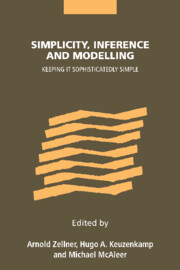Book contents
- Frontmatter
- Contents
- List of figures
- List of tables
- List of contributors
- 1 The enigma of simplicity
- PART I The importance of simplicity
- 2 What is the problem of simplicity?
- 3 Science seeks parsimony, not simplicity: searching for pattern in phenomena
- 4 A macroeconomic approach to complexity
- 5 The new science of simplicity
- 6 What explains complexity?
- 7 Occam's bonus
- PART II Simplicity in theory and practice
- Index
3 - Science seeks parsimony, not simplicity: searching for pattern in phenomena
Published online by Cambridge University Press: 22 September 2009
- Frontmatter
- Contents
- List of figures
- List of tables
- List of contributors
- 1 The enigma of simplicity
- PART I The importance of simplicity
- 2 What is the problem of simplicity?
- 3 Science seeks parsimony, not simplicity: searching for pattern in phenomena
- 4 A macroeconomic approach to complexity
- 5 The new science of simplicity
- 6 What explains complexity?
- 7 Occam's bonus
- PART II Simplicity in theory and practice
- Index
Summary
Karl Popper (1961) is perhaps best known for reminding us that facts can falsify theories but cannot validate them. The theme of this chapter derives from another, less well known, dictum of Popper's: science does not aim at simplicity; it aims at parsimony. First, I will make some preliminary remarks about the goals of science. Then I will comment on the contributions of parsimony and simplicity to these goals. Finally, I will say something about the role that parsimony and simplicity have played in my own research and, in particular, my research in economics and statistics.
The goals of science
I will assume, for the purposes of this discussion, that the scientist may be concerned with one or more of the following goals:
1. (Basic science) The central goals of basic science are (1) to describe the world (reality, if you please): both (a) specific facts about it (‘The Earth revolves about the Sun each 365 1/4 days’) and (b) generalizations (laws) that describe collections of phenomena (‘The periods of the planets around the Sun vary as the 3/2 power of their distances from it’, Kepler's Third Law) and/or (2) to provide explanations of these phenomena (‘Each planet is accelerated toward the Sun by a force that varies with the ratio of its mass to the square of its distance from the Sun’). Basic science is aimed at knowing and understanding.
- Type
- Chapter
- Information
- Simplicity, Inference and ModellingKeeping it Sophisticatedly Simple, pp. 32 - 72Publisher: Cambridge University PressPrint publication year: 2002
- 11
- Cited by



